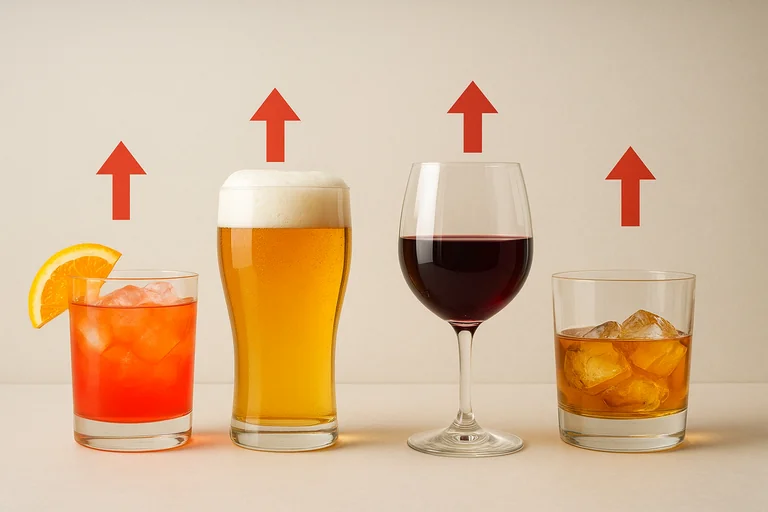A 2 minute assessment to get a personalized mental health or alcohol recovery plan.
When considering whether tequila deserves its reputation as the "healthiest" alcoholic beverage, understanding that a standard 1.7-ounce pour contains 113 calories is just the beginning of a metabolic nightmare that most drinkers never see coming.
This agave-based spirit has captured millions of health-conscious Americans who've embraced it as a supposedly clean and natural alcohol choice, yet the vast majority remain completely unaware of how profoundly this "diet-friendly" spirit sabotages their weight loss efforts.
Here's what makes this so critical: alcohol immediately halts all fat burning for up to 36 hours, regardless of its source.
While tequila marketers promote their product as organic, natural, and somehow different from other spirits, the metabolic reality tells a dramatically different story.
Understanding the true impact of tequila consumption—from those baseline 113 calories to the elaborate cocktails and late-night food binges that typically follow—could be the wake-up call that finally explains why your "healthy" drinking choices aren't supporting your fitness goals.
The Caloric Mathematics Most Drinkers Get Wrong
Before diving into tequila's metabolic mayhem, let's establish the baseline numbers that the industry doesn't want you to fully understand. That 113-calorie count for a 1.7-ounce pour represents pure tequila at standard 80 proof (40% alcohol).
But here's where the deception begins. Tequila contains the same 7 calories per gram of alcohol as every other spirit, making claims about its superiority purely marketing fiction.
The proof problem compounds the caloric confusion. Premium tequilas often reach 84-86 proof, pushing that 1.7-ounce pour to 119-125 calories. High-proof specialty tequilas can exceed 130 calories per serving.
The pour size deception becomes apparent in real-world consumption. While nutritional information assumes precise 1.5-ounce shots, actual pours vary dramatically:
- Standard bar pours: 1.5-2 ounces (100-133 calories)
- Restaurant margarita pours: 2-3 ounces (133-200 calories)
- Home free-pours: 2.5-4 ounces (166-266 calories)
- Party shots: Often 2+ ounces (133+ calories)
The frequency factor distinguishes tequila from other spirits. Its shot culture and party associations encourage rapid consumption of multiple servings. Three "standard" 1.7-ounce pours deliver 339 calories in minutes—before considering mixers or food.
The Metabolic Shutdown Nobody Talks About
Your Body's Alcohol Emergency Response
When tequila enters your system, your body treats it as a toxin requiring immediate elimination. This triggers a metabolic emergency that completely reshapes how your body processes everything else.
Your liver immediately prioritizes alcohol metabolism above all other functions. Fat burning? Completely stopped. Carbohydrate processing? Put on hold. Protein synthesis? Delayed indefinitely.
This isn't a brief interruption. The metabolic disruption from a single night of tequila consumption can persist for 24-36 hours. During this entire period, your body cannot access stored fat for energy.
The mathematical reality is sobering. If you drink tequila twice weekly, you spend 48-72 hours in a fat-storage state. That's 2-3 days out of every week when weight loss becomes metabolically impossible.
The Hormonal Cascade of Chaos
Tequila consumption triggers a complex series of hormonal disruptions that extend far beyond simple calorie math.
Cortisol elevation begins immediately with alcohol consumption. This stress hormone specifically promotes abdominal fat accumulation. The party atmosphere typically associated with tequila amplifies this cortisol response.
Growth hormone suppression occurs for hours after drinking. Since growth hormone drives fat burning and muscle maintenance, its suppression creates a double metabolic penalty.
Testosterone disruption affects both men and women. Alcohol significantly reduces testosterone levels, diminishing the hormone's fat-burning and muscle-building effects for days after consumption.
Insulin sensitivity crashes with regular alcohol consumption. Your body becomes less efficient at processing carbohydrates, increasing the likelihood that any food consumed will be stored as fat.
Blood Sugar Chaos and Cravings
Despite containing no sugar, tequila creates dramatic blood sugar disruptions that sabotage weight loss through multiple pathways.
The initial spike occurs as alcohol rapidly enters your bloodstream. Your body releases insulin even though tequila contains no carbohydrates, creating conditions that promote fat storage.
The inevitable crash follows within hours. Blood sugar plummets below normal levels, triggering intense cravings for high-calorie foods.
The craving amplification combines low blood sugar with reduced inhibitions. This deadly combination explains why tequila nights so often end with late-night Mexican food binges.
Tequila Cocktails: Where Calories Go to Multiply
Margaritas: The Ultimate Diet Destroyer
The margarita stands as tequila's most popular cocktail and one of the highest-calorie alcoholic beverages regularly consumed. A typical restaurant margarita contains 300-600 calories.
Classic margarita breakdown:
- Tequila (2 oz): 133 calories
- Triple sec (1 oz): 95 calories
- Lime juice (1 oz): 8 calories
- Simple syrup (0.5 oz): 25 calories
- Total: 261 calories minimum
Frozen margarita catastrophe multiplies the damage. Restaurant frozen margaritas often use pre-made mixes loaded with high fructose corn syrup. Large frozen margaritas can exceed 700-900 calories—equivalent to a full meal.
The size escalation problem has seen margaritas grow from 6-8 ounces to 16-24 ounces at many establishments. Jumbo margaritas can contain 3-4 shots of tequila plus proportionally more sugary mixers.
Palomas, Tequila Sunrises, and Other "Lighter" Lies
Palomas are marketed as the lighter alternative, but still pack 175-250 calories from grapefruit juice and soda. The perception of healthiness leads to overconsumption.
Tequila Sunrises combine orange juice (110 calories per 8 oz) with grenadine syrup (60 calories per ounce), creating a 250-350 calorie cocktail that masquerades as a breakfast drink.
Ranch Water seems innocent with just tequila, lime, and sparkling water. At 115-120 calories, it's lighter than other cocktails but still delivers full metabolic disruption.
The cruel irony? These "healthier" cocktails often lead people to drink more, believing they're making smart choices.
The Agave Myth Machine
How Marketing Manufactured a Health Halo
The transformation of tequila from party spirit to "wellness drink" represents one of the most successful deceptions in alcohol marketing history.
Celebrity endorsements have positioned tequila as the choice of fitness-conscious stars. When ultra-fit celebrities launch tequila brands, it creates powerful associations between the spirit and healthy lifestyles.
The organic obsession has led to premium organic tequilas marketed as cleaner, healthier options. Organic certification doesn't reduce calories or eliminate alcohol's metabolic disruption.
Traditional production worship emphasizes stone ovens, natural fermentation, and ancestral methods. These affect flavor, not health impact.
The "natural" narrative exploits the fact that tequila comes from a plant. Marketing materials emphasize agave's superfood status while ignoring that distillation removes everything except alcohol.
The Agave Benefits That Don't Survive Distillation
Here's what actually happens to those celebrated agave compounds during tequila production:
Inulin (prebiotic fiber): Completely eliminated during fermentation and distillationVitamins and minerals: Removed entirely by the distillation processAntioxidants: Destroyed by heat and alcohol productionBlood sugar benefits: Non-existent in the final product
The distillation process specifically removes everything except alcohol and water. Any health benefits of the agave plant simply don't transfer to tequila.
The Studies That Don't Say What You Think
Tequila marketers love citing scientific studies about agave, but they're counting on you not reading the fine print.
The prebiotic study examined raw agave inulin's effects on gut health. This compound doesn't exist in distilled tequila.
The blood sugar research looked at agave nectar, not tequila. These are completely different products with no shared properties.
The weight loss connection came from studies on agave fiber supplements. Again, fiber doesn't survive distillation.
This scientific sleight of hand creates an evidence-based veneer for claims that have no basis in reality.
Tequila's Appetite Apocalypse
Why Tequila Makes You Ravenous
Alcohol's effect on appetite is well-documented, but tequila's consumption patterns create particularly devastating hunger spirals.
Alcohol stimulates appetite through multiple mechanisms:
- Hypothalamic neurons that control hunger become hyperactive
- Ghrelin (hunger hormone) production increases
- Leptin (satiety hormone) signaling decreases
- Prefrontal cortex inhibition reduces self-control
The shot culture amplification means tequila enters your system rapidly, creating intense appetite stimulation in a compressed timeframe.
The Mexican Food Massacre
Tequila's cultural associations with Mexican cuisine create a perfect storm for caloric catastrophe.
Pre-meal destruction:
- Chips and salsa: 300-500 calories
- Guacamole: 200-300 calories
- Queso: 300-400 calories
- Total before entrees: 800-1200 calories
Main course mayhem:
- Restaurant burritos: 800-1200 calories
- Loaded nachos: 1000-1500 calories
- Combination plates: 1200-1800 calories
- Quesadillas: 900-1300 calories
The late-night multiplier occurs when tequila consumption extends into late hours. Metabolism naturally slows at night, making late-night Mexican food particularly likely to be stored as fat.
Social Pressure and Portion Distortion
Group ordering dynamics during tequila sessions often involve shared appetizers, multiple entrees, and desserts. Individual consumption can easily exceed 2000-3000 calories.
The celebration excuse links tequila with special occasions that justify dietary abandonment. "It's my birthday" becomes license for unlimited consumption.
Matching mentality creates pressure to keep pace with the group's eating and drinking, overriding individual satiety signals and dietary goals.
The Hidden Costs Beyond Calories
Sleep Destruction and Next-Day Damage
Tequila's impact extends well beyond the night of consumption through sleep disruption and next-day effects.
Alcohol significantly impairs sleep quality, affecting:
- REM sleep cycles crucial for recovery
- Growth hormone release during deep sleep
- Cortisol regulation
- Appetite hormones for the following day
Next-day consequences include:
- Increased hunger and cravings
- Reduced energy for exercise
- Poor food choices due to fatigue
- Continued metabolic suppression
The Exercise Impossibility
Tequila consumption creates multiple barriers to effective exercise:
Dehydration impairs performance and increases injury riskMuscle protein synthesis remains suppressed for 24+ hoursCoordination and reaction time suffer even after blood alcohol normalizesMotivation plummets due to fatigue and mood disruption
The result? Missed workouts and reduced intensity when you do exercise.
The Cumulative Effect
Regular tequila consumption creates a compounding negative effect on weight loss:
Week 1: 2 tequila nights = 48-72 hours of halted fat burningMonth 1: 8 tequila nights = 8-12 days without fat burningYear 1: 104 tequila nights = 104-156 days of metabolic disruption
That's 3-5 months per year when your body cannot burn fat effectively.
Breaking Free from Tequila's Hold
Recognizing the Real Cost
The first step in changing your relationship with tequila is honest accounting:
Direct calories: 113 per 1.7 oz pour × number of drinksMixer calories: 150-500 per cocktailFood calories: 500-2000 from tequila-induced eatingMetabolic cost: 24-36 hours of halted fat burning
A single tequila night can easily cost 1000-3000 calories plus 1-2 days of metabolic disruption.
Strategies for Reduction
If you're not ready to eliminate tequila entirely, harm reduction strategies can help:
Frequency limits: Maximum once per month for special occasionsQuantity controls: Single serving maximumFood planning: Eat before drinking to reduce appetite stimulationMixer modifications: Soda water and lime onlyTime boundaries: No tequila after 8 PM to protect sleep
Better Alternatives for Weight Loss
Non-alcoholic spirits provide complex flavors without metabolic disruptionSparkling water cocktails offer sophistication with zero caloriesKombucha delivers probiotics and interesting flavorsHerbal tea blends create warming, comforting alternativesFresh juice spritzers provide sweetness without alcohol
The Bottom Line: Tequila's True Weight Loss Impact
The harsh reality is that tequila and successful weight loss are fundamentally incompatible for most people. Those 113 calories per 1.7-ounce pour tell only a fraction of the story.
Between direct calories, mixer additions, food binges, and 24-36 hours of halted fat burning, regular tequila consumption makes sustained weight loss nearly impossible.
The marketing myths about agave benefits, natural production, and tequila being a "clean" spirit are exactly that—myths designed to sell product, not support your health.
If weight loss is truly your priority, tequila should be treated as an occasional indulgence at most, not a regular part of your lifestyle. The metabolic mathematics simply don't support any other conclusion.
Your body cannot burn fat while processing tequila. Every shot represents a significant setback to your weight loss efforts. Understanding and accepting this reality is essential for making informed decisions about your health and fitness goals.
Ready to Break Free from Tequila's Weight Loss Sabotage?
If you're tired of letting "just a few drinks" derail your fitness goals, professional support can help you develop a healthier relationship with alcohol. Take control of your health and finally achieve the weight loss results you deserve.
Take Our Confidential Assessment →
If you're experiencing difficulty controlling alcohol consumption or having thoughts of self-harm, seek immediate professional help. Call 988 for the Suicide & Crisis Lifeline. This information is educational and should never replace professional medical advice.




